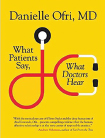BOOKMARK
Title: What Patients Say, What Doctors Hear
Author: Danielle Ofri, MD
Publisher: Beacon Press
Publication date: February 2017
Price: $24.95, hardcover, 288 pages

Despite our scientific and medical advances, the single most important diagnostic tool is the doctor-patient conversation, which is key to determining the issues and needs of a patient. However, today’s hyperbusy medical environment and the rapid pace of medical advances coupled with specialization and superspecialization can unwittingly create a gulf in the doctor-patient relationship. Consequently, the interaction between anxious patients and overworked doctors can lead to a lack of concordance and other communication gaps that affect the delivery of care.
According to a new book by Danielle Ofri, MD, What Patients Say, What Doctors Hear, the world of patient and doctor exists in a special place, which needs to be preserved and nurtured. And, in this well-written book, she presents compelling evidence that even as medicine appears to be dominated by technology, solid human relationships within the system present the best way forward to ensure good clinical outcomes.
Dr. Ofri, Associate Professor of Medicine at the New York University of Medicine, has cared for patients at New York’s Bellevue Hospital for more than 20 years. She has also authored five previous books, most notably the highly acclaimed Singular Intimacies: Becoming a Doctor at Bellevue.
Garden of Interesting Stories
What Patients Say, What Doctors Hear is organized into 16 chapters; each one is a case history, of sorts, by which Dr. Ofri gives personal insight into the value of meaningful conversation and personal interface with patients. Naturally, this is not new terrain; there are a plethora of books and articles about doctor-patient communication, but Dr. Ofri is not only a talented writer, she has cultivated a garden of interesting stories to tell, many that will sound fresh.
Mr. Amadou serves as [the author’s] continual reminder that how doctors and patients communicate is not just a pleasantry of good bedside manner, but the most critical part of medical care.—
Tweet this quote
She leads off with a patient case history about a needy West African patient. “It was late on a Thursday evening, and I already had one foot out the clinic door when my office phone rang. It was Oumar Amadou. “I’m not feeling well,” he said. “I need to see you, Dr. Ofri. I need to see you now.” The annoyance in his voice was apparent, even with his thick West African accent.” At this point, the author has shown more patience than most busy clinicians at the end of their days. In the few months she has known Mr. Amadou, he’s called her at least 50 times, complaining of various real and hypochondriac maladies.
Moreover, he constantly shows up at her clinic without an appointment. However, beyond his annoying solipsistic behavior, he does, at age 43, have a severe heart condition, so when he called on that Thursday, Dr. Ofri took his concerns seriously. She told him to go to urgent care in the morning and see one of her associates. He refuses, insisting he see Dr. Ofri only.
The next day, he arrives to see Dr. Ofri without an appointment, and during their exchange, he collapses and is rushed to the emergency room, where he survives a near-death cardiac event. Dr. Ofri writes: “For all his annoying pushiness, he was fundamentally trying to say, ‘Help me.’” At the end of the chapter, she tells the reader that Mr. Amadou serves as her continual reminder that how doctors and patients communicate is not just a pleasantry of good bedside manner, but the most critical part of medical care.
A Calling, Not a Profession
She’s right, of course. But her patience and resilience are far beyond those of most stressed-out, overburdened clinicians. Throughout each chapter, we are visitors into the special world of a committed doctor who is tough on herself. We also see her grow as a doctor, a reminder that each patient is a new human experience, one shared in a complex and unforgiving medical system.
It’s tough being a good doctor. But Dr. Ofri makes the case that doctoring isn’t a profession, it’s a calling. This book is recommended for The ASCO Post audience as a learning tool and a fine and interesting read. ■

